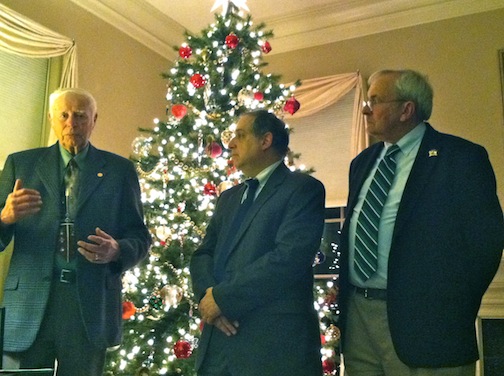State legislators and activists came together in a Biltmore Forest home last night, Dec. 8, to build support for redistricting reform in North Carolina.
Under the current system, the General Assembly is charged with redrawing voting districts every 10 years to keep them in line with the latest census data, empowering legislators to decide which voters they represent. The task fell to the Republican Party this time, which has a majority for the first time in more than a century. And perhaps taking a lesson from how the Democrats operated for decades before them, they drew boundaries in ways that could ensure dominance for many years to come.
The new lines created outrage in Western North Carolina by taking most of Asheville out of its longtime home in the mountainous 11th Congressional District, currently represented by Democrat Heath Shuler. The idea, said observers, was to dilute his Democratic support in the Asheville to make him more vulnerable to a Republican challenger next year. But the new lines also generated bipartisan criticism for placing the city in a 10th District that stretches to Gastonia and has little in common with the area — historically, culturally or economically.
The GOP majority also “double-bunked” two popular local Democratic members of the House – Reps. Patsy Keever and Susan Fisher – forcing one of them to step down or challenge the other in a primary.
The lines are currently being challenged in court. Meanwhile, critics are trying to channel the anger they generated to pass a bill in the Senate that would wrest the power of redistricting from the hands of legislators and give it to an independent commission. The measure passed the House overwhelmingly earlier this year, with strong bipartisan support. But it’s been stalled in the Senate for months, and a vote has yet to appear on the schedule.
The delay, said Rep. Ray Rapp of Madison County, “is about power politics. It’s about ‘We’ve got the power, why would we give it up?’ It’s very obvious what the motivation is.”
Tom Coulson, who helped organize the meeting on behalf of Common Cause, echoed that sentiment, telling the roughly 50 attendees (including Asheville City Council member Cecil Bothwell, Buncombe Register of Deeds Drew Reisinger and former Speaker of the House, Marie Colton) that, ” When it comes to redistricting, the needs of the party come ahead of the needs of society.”
But Rapp — a Democrat — reported that it’s not just the new Republican majority holding things up, saying “We’ve got problems with this on both sides of the aisle.”
And two of the most important figures in the Senate represent portions of Buncombe County, he noted, urging locals to tell Sen. Tom Apodaca and Sen. Martin Nesbitt to pass the bill. Apodaca, a Republican who’s district includes much of southern Buncombe, heads the powerful Senate Rules Committee, and has the power to kill the bill by not bringing it for a vote, explained Rapp.
Meanwhile, Nesbitt, a powerful Democrat who serves as the Senate Minority leader, isn’t supportive, reported Jane Pinsky, a lobbyist who heads a coalition seeking passage of the bill. In a meeting with Pinsky a few months ago, Nesbitt said he “thinks legislators can do redistricting better than anybody else because they know their districts best,” she reported.
Pinsky urged attendees to contact both senators to tell them to support the bill. And she said her coalition will be continuing its campaign on its behalf, organizing a conference in Raleigh in the spring that will seek to bring together North Carolina officials with those from Iowa, which has a redistricting system similar to the one being considered in the Senate.
The system in Iowa, she said, is free of the kind of political gerrymandering and legal disputes that have plagued North Carolina for decades.
“We can’t afford to go through the stupid process we’ve gone through in the past, she asserted. “One of the reasons people don’t vote is because they don’t think there vote matters — and it doesn’t if legislators draw their own districts.”
Watch video of the Dec. 8 meeting, held at the home of Terry Van Duyn in Biltmore Forest
Here, Rep. Rapp talks about the problems with the current redistricting system:
And Rep. Rick Glazier of Cumberland County discusses the reform bill under consideration in the Senate and the Iowa system it’s modeled after:




Funny. Where were they when the Democrats were in charge of redistricting? They must really think that we are fools. What a much of taxpayer dependent state pension pinheads. btw, when you read the bill it specifically allows the General Assembly to draw the maps once the “independently drawn” maps are twice rejected.